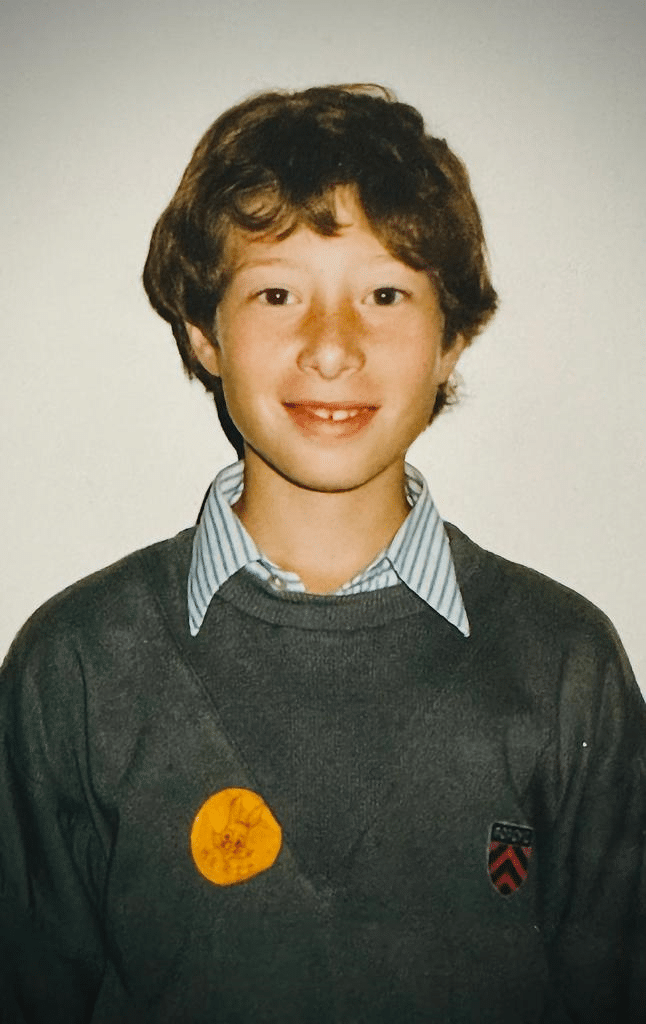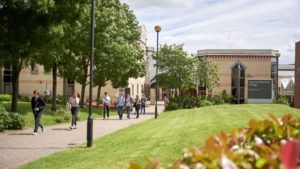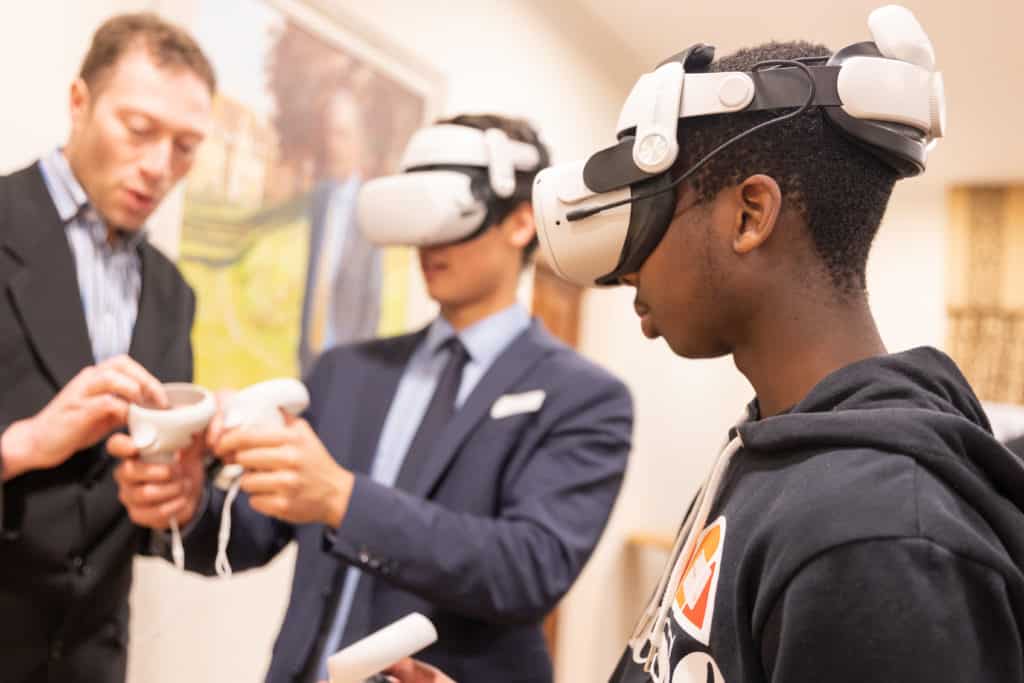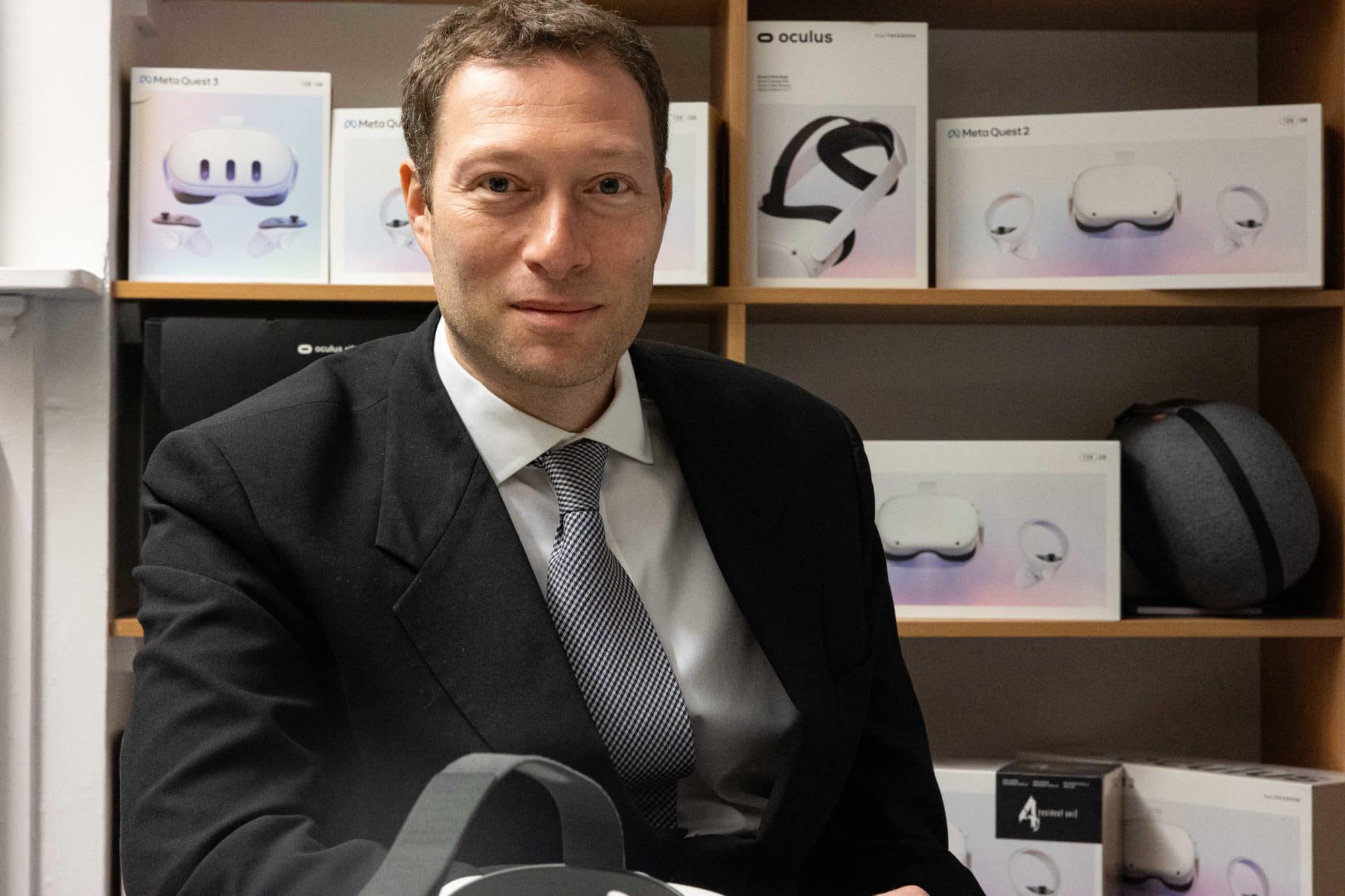When I was little, I’d have recurring dreams about travelling through space and visiting other planets. Incredibly I can now recreate these childhood dreams and experience them lucidly via Virtual Reality.

Trevor Benstock, Ed Tech Innovator and IT Services Director at Bradfield speaks to Katie Green-Armytage about his journey to creating Campus-XR and the inspiration that he has received along the way.
Early Inspiration
Trevor was a highly creative and curious child, he loved school but was frustrated at the pace and repetition of early years learning, he picked things up quickly and grew eager to explore beyond the confines of the classroom. A serial innovator, Trevor derived huge satisfaction throughout his life from finding solutions to the various challenges that he observed around him. Campus-XR is the pinnacle of his achievements to date. This finely tuned EdTech solution combines virtual reality and artificial intelligence with the knowledge he has amassed through 20 years working in the education sector.
Campus-XR provides a highly engaging educational experience for all learners, personalised to their ability, learning style and interests… MY ASPIRATION IS TO CREATE something revolutionary for education EVERYWHERE.
At the age of 7, his primary school teachers noticed a ‘spark’ in him and decided it best to put him up a year, a move which caused more social than academic discomfort. He describes himself as being a rather stereotypical studious type, introverted, shy and quiet but highly observant with a strong visual imagination. When at home, however, he came out of his shell, more confident in the familiar surroundings of a household filled with music, technology and creative opportunity.

Trevor’s mother was a classically trained singer and musician who joyfully sang whilst carrying out household chores, the house itself was littered with different instruments, which Trevor was encouraged to play, teaching himself by-ear and through mimicry. He believes that his love of music fundamentally helped shape his early cognitive tendencies and approach to problem solving, listening/observing, experimenting, identifying patterns and then layering understanding through iterations of complexity – cause and effect.
He also shared his father’s passion for tinkering with technology. Trevor’s father had repurposed the spare bedroom into a dedicated tech-room, he remembers watching and sensing his father’s excitement when figuring out how to program the then cutting-edge ‘BBC Micro’ (it was 1982).

Trevor was curious to understand for himself what this ‘programming’ was all about and used to sneak into the room to modify the lines of code on screen, then type “RUN” to see what would happen. Everything he learned was through play and experimentation as opposed to formal teaching and his first reflection was that if learning is fun it doesn’t feel like learning in the school sense but it is no less effective.
I strongly believe that my creative childhood pushed me ahead, my parents set the tone and I really enjoyed learning. I was inspired by my parent’s enthusiasm for art and technology.
Unfortunately, Trevor’s parents separated and the family relocated before his 11th birthday. His secondary school experience was completely different from that of his primary. Bullying was not addressed and there was a definite incentive for children like Trevor to keep his head down, blend in and be as invisible as possible. At this time football became his obsession and outlet, a double-edged gift that helped him to see off any potential trouble as well as allowing him to pursue a natural ability. As an additional survival mechanism, he purposefully hid his light under a bushel in the classroom, something that regardless of his natural ability put him in reverse academically.
True academic achievement would therefore have to wait until he moved on to Sixth Form College, which felt like a comparatively utopian environment. His guardian angel of football no longer required, he settled back into his academic studies, taking A-Level English, Computer Science and Graphical Communication (which combined coding with 3D rendering of vectors and polygons, perfect knowledge as it happens for VR, something clearly not fully conceived at this time) and returned to his previous pastime of music.

Trevor then went to Portsmouth University to study Business Information Technology. Delighted to leave home and have true independence, he loved his degree course, socialising and growing in confidence he gradually shed his shy tendencies, and simultaneously had his first taste of entrepreneurship – being one of the very few students prepared to do the washing and ironing, he set up a service and was able to make a small living for himself, leaving his first year with a profit instead of debt.
I’ve always been very happy to help and found that in doing so there are niches everywhere, either taking away problems from other people or creatively finding alternative solutions that solve problems better.
Technology Insight
Post-university the internet was advancing rapidly and as luck would have it the UK’s largest Internet Service Provider was actively recruiting graduates. A few of Trevor’s friends alerted him to the role with UUNET, who were flourishing, expanding their backbone infrastructure around the UK and Europe. He wanted to say that it was a tough interview, but truth be told it wasn’t, the company were on the lookout for appropriately qualified graduates to assign to an ever increasing and demanding corporate customer base. Numerous modules within Trevor’s degree course were dedicated to network and systems architecture, he was an ideal candidate and was offered the job immediately.

Every week a vast number of new customers were on-boarded, it was a very exciting time to be in the industry and he moved up quickly from the Network Services Repair Unit to the ‘Network Operations Centre’, a 24*7 unit, with access to core backbone routers. Here he and his colleagues maintained and resolved all major network incidents throughout EMEA.
The role was based on Cambridge Science Park where he had ample opportunity to work alongside senior network architects and other similarly knowledgeable, motivated and curious creative minds, many of whom had attended Cambridge University. Trevor relished the intellectual discussions shared during long night shifts and growing in confidence took the opportunity to garner opinions on some innovative ideas that he had been working on in his spare time.

Of all these innovations, Trevor can say with a wry smile on his face that hindsight is a great thing. His creative mind was in overdrive, coming up with new ideas all the time, and he employed the same approach he’d discovered years earlier; observe/research, experiment, identify patterns and iterate complexity. But he didn’t have a large network of relevant contacts, he wasn’t versed in start-up methodology or patent law, nor, in truth, did he have the resources to push any of his ideas past early-stage prototype …. But significantly, he has learnt from his many lessons.
Hindsight is a great thing, as is learning from making mistakes. I learnt how to pick myself up and not get too disheartened, improve my understanding and try again. I think I’ve always been able to spot trends and sense opportunities, but I’m now much better equipped to protect my ideas and structure a business around them.
Trevor loved his time at UUNET and living in Cambridge, given the choice he would have stayed there, however change came calling. WorldCom, who were later taken over by Verizon, bought out the company and the business moved offices to Reading. By this time, he had been promoted to Director of Escalations for EMEA, a demanding 24/7 role. As the years passed in the corporate environment Trevor reflected, concerned that his existence felt increasingly hollow. He thought through his options, what would allow him to do something that made a difference beyond the bottom line? … he thought of education.
Education Insight
Trevor saw a job advert for the John Madejski Academy (JMA); The institution was moving to a new site, demolishing the old school and building a state-of-the-art campus in its place. They required someone to create and implement an entirely new IT solution from the ground up. It involved a pay cut, but it met his criteria; Somewhere he could make a real difference, not only from the IT side but also – drawing on his own experiences of secondary school – somewhere he could be a positive influence, nurturing and facilitating opportunities for young people.

It’s perhaps a cliché, but the small things make the biggest difference, like running after school clubs and making time for students who often put on an act but are really struggling, including the most naughty ones! Listening to them, following up on their progress and talking with them and their parents/carers about the bigger picture. It’s such a privilege to be able to have that level of positive influence in a young person’s life.
Trevor threw himself into every aspect of school life, before long he was tutoring, teaching, coaching, running football, badminton, health and fitness clubs, helping students wean themselves off of fast foods and improve their understanding of nutrition. He loved the work, being highly motivated to create the best educational outcomes for pupils and working alongside an excellent staffing team. Once he had built the IT solution, recruited a skilled team and had all IT systems up and running smoothly he was given a lot of freedom, already a strong voice on SMT he was voted in as school governor, and was encouraged to follow through with his innovative ideas.
Trevor worked at JMA for nearly 10 years, however after a series of leadership changes he felt it was time to move on. He found it heartbreaking to leave, as mentoring and working with young people at JMA was an extremely gratifying experience;
I am so pleased that I moved on from the corporate machine to education because for me, I thrive in an environment where I can help others.
The genesis of Campus-XR
Moving to Bradfield was a chance for Trevor to stay within education, indulge in a hearty IT transformation project whilst re-finding his innovative spirit. His arrival in 2013 heralded a dramatic improvement in Bradfield’s IT capabilities, taking technology right to the forefront of what is possible, with systematic improvements in place to ensure that the infrastructure was suitably upgraded, resilient and future proof. Having built an extremely strong IT department and set up continuous infrastructure improvement programmes Trevor once again took the opportunity to innovate and think beyond the current paradigm to help Bradfield with a premium and relevant education offering fit for the 21st century.

For the benefit of the school and for the benefit of the education Trevor searched for a solution that could enhance every learner’s experience and making learning fun as well as help teachers convey complex concepts to pupils. Bringing together all his educational and technological experiences, the penny dropped when he experienced VR for the first time. This was the platform that he had been waiting for, much like the early internet and mobile phone technologies, that had changed society so dramatically years before, he could see the next wave on the horizon and he was in the perfect place with the right skills to develop Campus-XR, a personalised and immersive educational solution for all.
I’ve seen the emergence of game changing technologies on the distant horizon before, but timing and luck have their part to play when trying to ride the wave. I’ve not been in the right position with the right support to take full advantage previously, however this time THINGS ARE different, all the pieces are coming together.
Interested to learn more?
If you are interested to know more about Campus-XR, including investment opportunities, visit their dedicated Campus-XR website and for more information contact Kester Russell, Bradfield College’s Commerical Director on krussell@bradfieldcollege.org.uk



